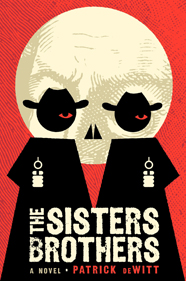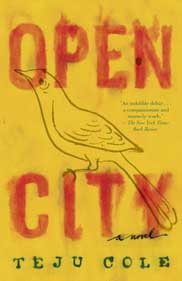by Nathacha Appanah
Buy at Powell’s »-
March 27, 2012
Semifinals
-
Patrick deWitt
4The Sisters Brothers
v.
3Open CityTeju Cole
-
Judged by
Alyssa Rosenberg
There’s something fitting about putting Julius, the isolated psychiatrist who is the main character in Open City, Teju Cole’s meandering journey through New York, up against Eli Sisters, the depressed hired killer churning across the Pacific Northwest to California in Patrick deWitt’s The Sisters Brothers. They’re both profoundly distanced from the world, though for different reasons. Julius, a Nigerian immigrant, is recovering from a breakup that touched him deeply and the illness of his mentor, while Eli is increasingly disturbed by the psychopathic behavior of his brother and eager to break away from their tyrannical and capricious employer, the Commodore. Both men must grapple with their absent mothers, the implications of fleeting sexual and romantic encounters, and the damage they’ve left behind them.
The Sisters Brothers brings to bear the conventions of genre fiction, including horse surgery and poison-enhanced gold panning, to force Eli to action. Open City has only life in contemporary New York and Julius’s alternately academic and joyful perspective on it as he goes on long walks, and yet feels stranger and more transcendent.
Eli’s moment of greatest wonder and tragedy comes when he and his brother Charlie have tracked down their target, Hermann Kermit Warm. The Commodore’s wanted him killed to steal a chemical formula Warm invented that makes gold panning a vastly more efficient process. But when Eli and Charlie find Warm, they talk him into hiring them as his assistants instead—despite signs that the formula is more dangerous to the user than Warm previously imagined. As they pour it into the river in pursuit of a haul, Charlie’s shooting hand gets soaked in the fluid, maiming him.
But even in the midst of that tragedy, which is also Eli’s potential liberation from the work of killing, Eli sees a marvel: “The flakes and fragments of gold, which moments earlier were cold and mute, were now points of the purest yellow-and-orange light, and just as distinct as the stars in the sky…I looked at Charlie. His face had softened, gone slack, his pain and anger removed, forgotten, and I saw his throat drop as he swallowed. My brother was overwhelmed. He looked into my eyes. He smiled at me.” It takes something utterly new and strange to make Charlie act human.
Julius, by contrast, has his encounter with the light in decidedly sillier circumstances: At a moment of transition, he goes to a concert at Carnegie Hall and accidentally locks himself out on a fire escape far above the street, a situation that requires some careful walking, but no undue panic. The miracle for him is not a poisonous philosopher’s stone, but the fact that he can see the stars at all in Manhattan.
And unlike Eli, his revelation is less one of connection than of profound beauty even in the midst of loneliness: “I wished I could meet the unseen starlight halfway, starlight that was unreachable because my entire being was caught up in a blind spot…It would arrive in due time, and cast its illumination on other humans, or perhaps on other configurations of our world…My hands held metal, my eyes starlight, and it was as thought I had come so close to something that it had fallen out of focus or fallen so far away from it that it had faded away.”
In the moral universes of the novels, there’s something fitting about those fates. Eli no longer particularly wishes to continue killing for the Commodore, or for anyone else. But he liberates himself by an act of murder, and doesn’t particularly reckon with his past bad acts. He is freed from continued murder by Charlie’s loss of his hand, but Eli never was so convincingly wracked by guilt as to make a true examination of his conscience a worthwhile prospect. That wooly remove is of a piece with Eli’s failure to connect with people other than Charlie, and to understand those failures. A moment of genuine recognition sometimes seems the most the character can aspire to.
But when we leave Julius, we’ve come to understand that he’s not unable to overcome his isolation, but that it may be a proper penance for a grave misdeed. I suspect that some people will find the way in and the timing with which that sin is revealed frustrating. But it reminds me of Spike Lee’s upcoming Red Hook Summer, a rigorously plotted three-act movie with a late revelation that leaves a wound at the end of the film that’s never properly sutured. In The Sisters Brothers, outlaws find there is crude but effective surgery, there is mother, and there is home. But in Open City, as in life, there are some sins that cannot really be shriven.
Match Commentary
By Kevin Guilfoile & John Warner
John: One of the meta-discussions in the tournament every year, and one that’s been especially robust this year thanks to the commenters is “what makes a book good,” or for the purposes of our nonsense here, “what makes one book better than another.”
I think pretty much everyone has stipulated that there’s no formula for these things, that the response to a book is always subjective, not just in terms of judging quality, but in what people take away from a particular reading experience. You talked earlier in the tournament about books and readers meeting in the middle, and I think that middle is probably in a different location for each and every book and reader.
Which is one of the things that makes reading so cool. According to this article in the New York Times, it even “improves us as human beings.”
This is good because I have a hunch that my watching Keeping Up With the Kardashians has the opposite effect.
Anyway, I raise this issue of criteria because every year during the tournament, as we march through the brackets, I begin to worry about these commentaries, about running out of stuff to say as we’re confronted with a book three or four times and yet, each year, as the field narrows, there are still insights from the judges to mine for purposes of conversation.
For me, in today’s comment from Judge Rosenberg, I was once again shown something fresh about Open City where she describes Julius’s isolation and wanderings as his “proper penance for a grave misdeed.” Maybe this insight is obvious to others, but it really set its hooks in me and opened up the book in fresh ways, because while I always felt that Julius had a motive for what he was up to, I didn’t understand it, and now I do. It made me feel very sad for Julius, even though I read this book months ago.
Maybe one way we can know that the tournament is getting something “right” is that the books that advance continue to generate comments and controversy even the third time around.
Kevin: I was struck by that remark as well, because I was thinking of it as something similar, in my mind maybe more of a purgatory. My impression was that it was more like a sentence he didn’t quite understand for a crime he didn’t exactly remember—a search where he didn’t know quite what he was looking for, which is as good a definition of life as any.
This much is certainly true about Open City: Over the course of these judgments and the subsequent conversations, both with you and the terrific ongoing one in the comments, I have gone back to the text of Open City more than any other book in the ToB. That’s not nothing, and my feelings about it have evolved. I haven’t met him in the middle yet, but I can now sort of see Teju Cole from where I am and I can give him one of those respectful, two-finger salute/waves.
Yet, I am sad to see The Sisters Brothers go down. I think only twice has my favorite book won the tourney—David Mitchell in the first year and maybe Junot Díaz (although I’m not sure he counts because I don’t think I read his book until after the tourney was over).
John: I too am usually disappointed by the ultimate outcome of the tourney, with only Cloud Atlas and The Road being my favorite books from a particular tourney to win, though like you with Oscar Wao, my enjoyment of The Road came a good year after it won the prize. Though given how varied sentiments seem to be among the commentariat toward the books, I think it’s probably a fair guess that at least 80 percent of our tournament followers fail to have their favorite wind up at the top of the podium each year.
Kevin: Sadly, the news that reading fiction is good for our brains is probably the last thing the novel needs right now. That argument for getting people to read sounds awfully similar to the one that tries to get everyone to take fish oil pills and eat more kale, and is likely to be about as successful.
Although seriously, baked kale chips with Parmesan? Yum!
Speaking of brains and yum, this was our last match before the Zombie Round. Which means that we need to go back and consult the poll results one final time and we find that, wait a minute… Oh, my.
The Sisters Brothers received the second most votes in the Zombie poll. So deWitt’s book will return(!), unseating one of our current Zombie contenders, one of the two novels that have been solidly in that position since the end of the opening round.
Yes, the final Zombies of 2012 are The Sisters Brothers and The Art of Fielding.
Yay for me!
But we have a problem. Normally we would pair up Zombies and semifinal victors in such a way as to avoid any rematches. But this year we have a repeat bout either way. The Art of Fielding and The Sisters Brothers were both knocked out of competition by Open City.
So, as determined in the sacred text of our unwritten and just-now-improvised bylaws, we go to the coin flip. Heads and The Art of Fielding will get a rematch of its opening-round bounce by Open City, while The Sisters Brothers will take on Lightning Rods. Tails and it’s The Sisters Brothers versus Open City and The Art of Fielding versus Lightning Rods.
This is exciting. Here we go.
All right. There it is. So tomorrow, Lightning Rods will meet The Sisters Brothers with the great and honorable E. Lockhart judging. Thursday, Open City will take on The Art of Fielding once more, with the honorable and great Walter Kirn as judge.
Also tomorrow: More special guests will be joining us in the booth.

















